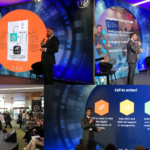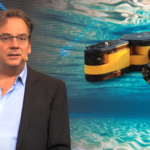Early detection and innovative treatment methods are critical in the fight against life-threatening diseases. At the 2024 AI for Good Global Summit, Le Lu, a researcher and Senior Director at Alibaba DAMO Academy, presented groundbreaking advancement in cancer screening using AI. His presentation focused on the transformative potential of AI in detecting and diagnosing some of the deadliest cancers, offering new hope in the fight against this pervasive disease.
An AI-Powered Tricorder
Le Lu introduced the session by referencing a popular cultural icon—the Tricorder from the “Star Trek” series—a device capable of diagnosing any ailment. While acknowledging that we are far from the full capabilities of such a device, he highlighted the significant strides made in cancer detection.
“We are close to having the first part [of the Tricorder’s function], which is detecting cancer,” Lu explained, emphasizing that early detection is a crucial step in improving survival rates.
Key Developments in Cancer Screening
The core of Lu’s presentation revolved around the AI solutions developed at Alibaba DAMO Academy, particularly for seven of the deadliest cancers: breast, lung, esophageal, stomach, colon, pancreatic, and liver cancers. These seven account for 70% of cancer deaths and 50% of new cases annually.
“Our [AI systems] can detect these cancers and are already available on Al cloud through public APIs,” Lu stated.
This technology allows for early detection and intervention, potentially saving countless lives.
The Journey from Vision to Reality
Lu, who has been involved in AI since 1996, shared his extensive background in computer vision and medical imaging. Before joining Alibaba, he worked on lung and colon cancer screening at Siemens. His experience has been instrumental in developing the AI models now used for cancer detection. He pointed out that while traditional imaging methods like low-dose CT scans for lung cancer and mammography for breast cancer have been standard, AI offers a new dimension in accuracy and efficiency.
He also touched upon the emerging field of liquid biopsies, where a small blood sample can potentially detect up to 50 types of cancer. However, he noted that these tests are not yet FDA-approved due to their low signal-to-noise ratio and other complexities.
“We do not have a perfect solution, but we do have a solution,” Lu admitted, highlighting the ongoing challenges in achieving clinically effective cancer screening methods.
Real-World Impact
Lu provided compelling case studies to illustrate the effectiveness of their AI systems. In one instance, a patient in China underwent a routine chest CT scan covered by insurance. Although the initial report showed no abnormalities, Alibaba’s AI model re-analyzed the data and identified a potential pancreatic tumor. The follow-up examination confirmed the diagnosis, and the patient underwent successful surgery.
“Our AI made the right prediction, […] and the patient is now cancer-free,” Lu proudly shared.
Another case involved a grandmother who, while taking her grandson to the hospital, was found to have potential pancreatic cancer through a chest CT scan. Again, the AI model’s analysis proved accurate, leading to early intervention and a positive outcome. These stories underscore the life-saving potential of AI in clinical settings.
The Future of Cancer Screening
Looking ahead, Lu emphasized the importance of maximizing the clinical value of available data. He discussed how their cloud-based system could be used for various types of cancer screening, including esophageal, liver, and colon cancers. “Once you have the data, we’re trying to figure out whatever you have and achieve the maximum clinical value,” he noted. This comprehensive approach aims to utilize AI not just for specific cancers but as a general tool for health monitoring and disease prevention.
While the advancements are promising, Lu acknowledged the challenges that lie ahead. The high-dimensional nature of sequencing data and the variability of biomarkers over time present significant hurdles. However, he remains optimistic, believing that continued research and collaboration will eventually lead to more robust solutions. As AI technology continues to evolve, it holds the promise of revolutionizing medical diagnostics and treatment.


















